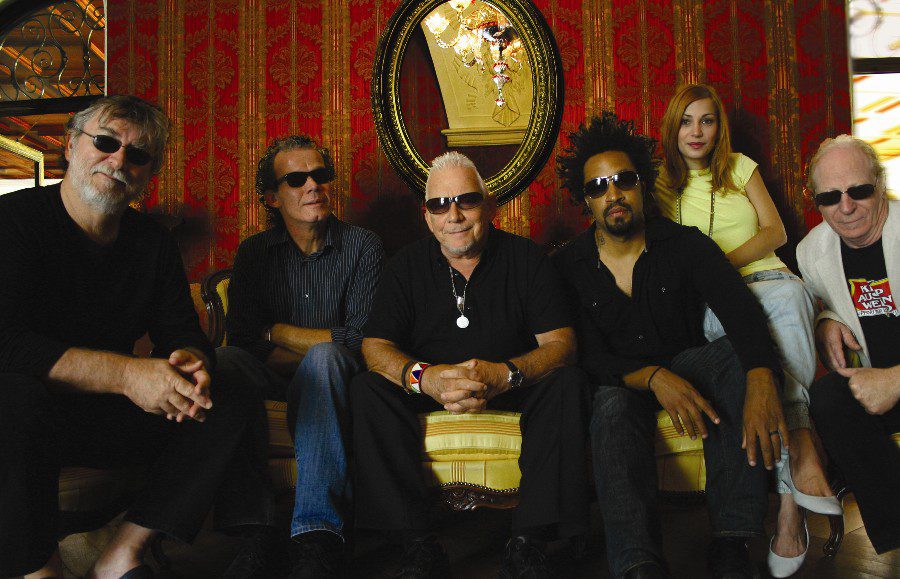
SEPTEMBER 2009: by BRADLEY MASON HAMLIN for MYSTERY ISLAND MAGAZINE
Photos by Marianna Proestou © 2009
BMH: We were sad to hear of the passing of Bo Diddley last summer. You of course wrote a great song about him, “Story of Bo Diddley” for your first album back in 1964. That lyric was the first in a series of capturing musical history through song. [See: “Monterey” and “No More Elmo”]. Tell us a little about writing that song.
ERIC BURDON: It all started in 1964. Bo Diddley was on tour with a German band called the Rattles. He came to Newcastle to play at the Auditorium. The Animals were just starting to become known around our hometown area. I was a big fan of Bo Diddley, and I really wanted to meet him. I set out to invite Bo to come check us out at the nightclub where we were performing that night. I never got to actually meet Bo that day, but I did meet his band at a nearby restaurant that was frequented by the people who played at the Auditorium. They told me Bo was not in the house. Nevertheless, the word must have gotten out to Bo’s assistant /vocalist/percussionist, Jerome Green. So after their show Jerome made it to the club where we were performing, unfortunately Bo didn’t show up.
By the time we got into the recording studio I was looking for a way to record musically the fact that I was trying to reach Bo Diddley and couldn’t. I thought to myself, well, Jerome Green made it, why don’t we pretend that Bo Diddley did make it to the club. I was in the mindset, don’t let the truth get into the way of a good story. So we hit the Bo Diddley jungle beat and I did a vocal rap over it, telling a story how Bo Diddley did actually visit the club.
Now the task at hand is to finish the story of an ongoing music relationship with “Bo” for over 40 years. I am currently in the creative process of writing a new Bo Diddley tune.
As you pointed out “Monterey,” “No More Elmo,” and a few other songs that I’ve written have been about other artists as well. It is basically because at heart I’m just a fan who’s intentions are good and I’m inspired by other musicians that become more than musicians, more than singers. They become part of the fabric of our history and our lives. That is why I’ve ventured to take historical moments and put them into music. I love documentary movies and I’m basically a frustrated moviemaker but I got stuck in music. I do the best that I can to turn my visions and dreams into music. Since the early days I used to write about my experiences while on the road and about life in general. I would dress them up with collages and photographs. When I met Nina Simone she took a look at one of my journals and she told me, “You are a music historian.” Nina was the one to inspire me to continue in that vein, a trait that I have carried on to this day.
The last time I saw Bo perform was at the West Coast Blues Festival in Australia. He was a very different man and was obviously ill. He took the stage, sat down and played a wondrous set of memories wrapped in the blues. He wasn’t the Rock N’ Roll of the past, he had moved into a true delta blues man. At this performance, I sat on the edge of the stage sharing the Hammond organ with Margo Lewis; we were old friends so she didn’t mind. So here I am just a few feet away from Bo, up close and personal. But once again we wouldn’t meet; I had to leave to take another stage to do our set. A friend of mine went to Bo’s dressing room, where Bo asked, “Where is that Burdon? That little guy is always running from me.” My friend said Bo wagged his finger and said, “You just tell that Burdon to sing more Bo Diddley songs.” After Bo’s passing I was invited by his family to attend his funeral service in Gainesville, Florida. The service was an amazing, moving event.
BMH: Before we get into the newer material, let’s get the “House of the Rising Sun” question out of the way. You have sung that song about a million times out there, interpreted it wildly and beautifully in many different ways, and without a doubt you are the one person in the world most associated with that song. Yet, Alan Price is still listed as sole “arranger” for a tune that owes as much to its vocal presentation and its guitar riffs than it ever will to its keyboards. When was the last time Alan was called on this nonsense and can it ever be put right?
ERIC BURDON: “House of the Rising Sun” became our biggest seller and was the record that knocked the Beatles off the top of the charts after they had been exclusively at that position for at least 2 years. Every Beatle record went to the top of the charts and somebody had to break their grip. It just happened to be us with “House of the Rising Sun.” I should point out that there were problems right from the get-go with this little bastard of a song. There is a lot in it. The song has a lot of history; it is recognized worldwide and loved by many people. At the beginning nobody wanted to touch it in the music business. Radio people, record labels, they all thought it was too long of a song, wrong subject matter, provocative, offensive and all of the above. But the band believed in it and we all persevered. We did a Chuck Berry tour where we had to go on stage before Chuck and make an indentation into people’s memories, so “House of the Rising Sun” came in very handy. It was really different and people came away from the Chuck Berry show remembering Chuck Berry of course, but also remembering that song.
BMH: John Steel has had little or nothing to do with The Animals—since its original line-up—other than the reunions—and now he has somehow manipulated rights to The Animals name in the UK? What’s going on with this Steel situation?
ERIC BURDON: I can’t really speak freely about this matter because it is still in opposition, but I will tell you some of the history.
It hurt my soul to see that a life-long friend of mine, John Steel, was going out in England and other European territories with a band called The Animals/Animals and Friends/Animals II, you name it. I found out about this while I was touring England in 2001. Peter Barton, my agent at the time, would normally travel with us during this tour. One day we were in transit from one gig to another and Peter’s assistant came to pick us up. I asked him: “What happened to Peter?” and he said, “Peter had a gig in Copenhagen.” I then asked: “Whom was Peter promoting?” To my surprise I was informed that he wasn’t promoting—he was performing. So I said to the guy, “So you mean that Peter is a musician?” and the guy said, “Yes, of course he is not as good as you are, but he is trying his best. His Animals versions are pretty close to your original ones.” I then asked, “Are you saying Peter is going out pretending to be me?” I didn’t get an answer. Barton has been a true double agent from the very beginning. He is playing both sides and the middle.
If you really think about it, the whole thing is ridiculous. I hope this will come to an end soon so I can start touring England again.
BMH: From 1964’s “Baby Let Me Take You Home” all the way to 2004’s amazing rendition of “Factory Girl” you’ve given us a lifetime of damn fine music, and as if that wasn’t enough, you put together Soul of a Man in 2006, an excellent album that deserves some serious attention. The record begins with the title song, a Blind Willie Johnson classic, and just kicks butt from there on out. Tell us a bit about “Factory Girl,” then please describe the making of “Soul.”
ERIC BURDON: “Factory Girl” is a great Irish traditional song that I used to hear my grandmother sing in Gaelic. I also heard it by a great Irish band Paddy Malone and the Chieftains.
Tony Braunagel, my producer, was a lot of help to me by gathering the material and searching for soulful blues tunes for this album that had not necessarily been heard or were popular. We delved into the past and came up with the Soul of a Man CD.
“Red Cross Store,” made me realize that Katrina had happened before, in the form of many similar disasters down South. I am really proud of this CD it came from my heart and soul.
BMH: I particularly like “Come Se Llama, Mama.” Tell us about recording that song.
ERIC BURDON: I love the Latin attitude to life, and that is what this song is all about. Its kind of a sister song to “Spill the Wine.”
BMH: As of 2009, which song brings you the most joy to sing on stage?
ERIC BURDON: I enjoy performing every song, some more than others. The songs that I am a little uncomfortable with are the ones that I am still learning.
BMH: Is the road still a killer or are you having fun out there?
ERIC BURDON: The road is a killer. Traveling is not what it used to be. It’s not fun anymore. The air stewardesses are not there to serve you, they are there to control you and from the days of “Would you like a cocktail sir?” it is now sit down, shut up, and keep away from the toilets.
BMH: With all the traveling you do, do you ever worry about these cold and flu bugs floating around? What do you do to stay healthy?
ERIC BURDON: I try not to worry about it too much otherwise I will stay home. I don’t think that a paper mask is going to help that much. You’ve got to be inside of an airborne tight antitoxin firefighting suit and that just can’t happen. You can’t just parachute out of a commercial airliner. On the other hand you’ve got to travel; you’ve got to go with the flow. So I guess it comes down to a silent prayer.
BMH: You’ve also done some acting. Comeback and other projects, also played a part in the Doors movie, not a great film, but you did know Jim, and in thinking of that, it begs the question: Was Morrison really as big of an asshole as he seemed?
ERIC BURDON: Jim had many hang-ups, poor guy… but I guess the biggest one would be in regards to his father. This might explain his erratic behavior. In light of the fact that at the time of the height of his and The Doors’ fame, the public had cast him as certainly a dark but nonetheless prince of peace. Jim held inside so much hate and resentment for his father. I believe Jim’s father was a two star Admiral and one of the officers responsible for the covert action that began the Vietnam War. Heavy stuff to carry around, fame unto itself is not easy.
BMH: Now, the most interesting “Jim” was James Marshall Hendrix, known as Jimi Hendrix. Much has been made of the final phone call from his home and the weight you carry about what might have been done to possibly prevent his death. Tell us how you feel about Jimi.
ERIC BURDON: Talk about pain in my heart, they just won’t let this guy lie down. Insult to injury they keep moving his body around, let the guy die for God’s sake. Now I have my ex road manager, Tappy Rights, claiming that Jimi Hendrix was murdered. We all murdered Jimi Hendrix. The music business murdered him. We murdered him by not taking any notice when he cried for help. It’s sad but it’s true. I miss him. He was a great musician and he altered the way we listened to things and he altered the way we played. He is gone but not forgotten.
BMH: In addition to all this good music you make, you also write and create visual art. I loved both versions of your autobiographies: I Used to Be an Animal and Don’t Let Me Be Misunderstood. Both highly entertaining and very well written. Tell us about your writing. What have you been writing lately?
ERIC BURDON: Well thanks. Actually I wrote those books for myself. I’m writing all the time, I keep a diary when I’m on the road. At the present I’m working on an idea for a book that I also see as a screenplay.
BMH: How about poetry? I always thought you’d make a great poet.
ERIC BURDON: Poetry belongs to the poets. Only people can tell you if you are a poet or not.
BMH: Well, you’ve done more for us than any poet I know of. What about your visual art, what gets you motivated visually?
ERIC BURDON: I find myself drawn to pulp heroes, graphic novels … comic books. I was an avid collector years ago. But traveling, and more than one fire at home, have laid waste to much of what I had. I also love 3D art pieces that grow from industrial waste. Once again one must be a collector in order to put pieces together. At the moment I make the house I live in the in-the-works-art piece. Maybe later, down the line, I will get my act together. I try to get motivated. I get inspired and I put something down on paper and then I have to go away on tour for a month or so. I come back, I look at it, and wonder where was I going with this? If I don’t follow through and these things lie around they become old, disjointed, and they die. It’s hard to keep it up. I don’t try to make any excuses. I know my limitations. I know what I’m capable of and I know I’m not good enough like some people to pen stories under fire. I need peace and quiet to create.
BMH: Is it true you’re living out in the desert, amongst the coyotes, cactus, and a good woman?
ERIC BURDON: I live where the snakes and scorpions run. Cactus, coyotes, rabbits, and beautiful women surround me. So yes, I live out in the desert mainly because of my asthma. Basically that’s why I came to live out here, but the desert grows on you. Right now it’s hot at night and it feels incredible to be outside in the dark and feel the warm air embrace you as you look up at the stars.
BMH: Back to the music. Tell us about your current band. Who’s who and how do you feel about this lineup of musicians?
During my summer European Tour I brought a lyre player by the name of Georgia Dagaki, a young girl from Greece. I’m really happy with the current line-up.
BMH: When I saw you perform as the headliner of the Blues Festival in Sacramento in the 1980s—you said that your original ambitions were to own a new T-Bird and to play with American bluesmen on their own territory. Are there any blues performers you want to work with that you haven’t had a chance to meet yet? Do you still own a T-Bird?
ERIC BURDON: I was fortunate enough to play with most American blues men that I wanted to jam with on their home ground, and all around the world too. No, I don’t own a T-Bird, but I do own a cherry red Ford Ranchero pick-up truck that I call Hell Boy and I love it. It’s a piece of America’s history on wheels.
BMH: What’s next? Is there a new album in the works?
ERIC BURDON: Oh yeah.


